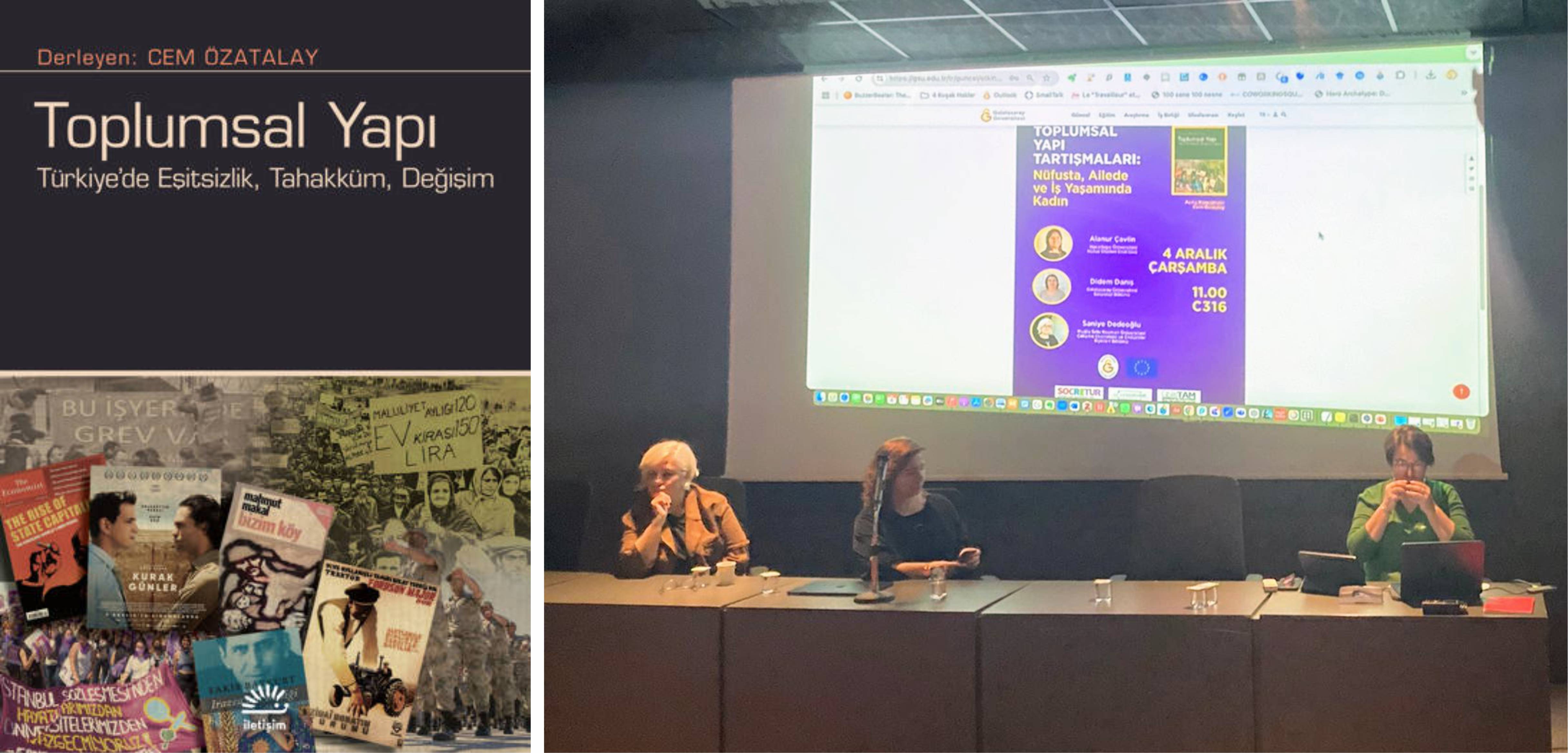Panel: "Reflections on Social Structure: Women in Population, Family, and Professional Life"
On December 4, 2024, as part of the SOCRETUR project (Social Rights as Tools of Europeanisation From Below: Crossed Perspectives on Europe and Turkey), a panel titled “Women in Population, Family, and Professional Life” was held at Galatasaray University. This discussion, featuring Alanur Çavlin, Didem Danış, and Saniye Dedeoğlu as speakers, addressed the topic from various perspectives.
Inequalities in access to social rights play a central role in shaping relations of domination and exploitation, which structure society both in Turkey and worldwide. The shrinking of social rights systems within the framework of the neoliberal world order leads, according to sociologist Robert Castel, to “negative individualism” among members of subaltern and/or minority identity groups. Deprived of social support, these individuals become trapped in relationships of dependency and violence, embodying what Castel calls “the negative individual.”
The situation of women in Turkey deserves, in this regard, an in-depth analysis.
A Collective Work to Analyze Gender Regimes and Social Structure
These reflections are further developed in the collective volume Toplumsal Yapı: Türkiye’de Eşitsizlik, Tahakküm, Değişim (Social Structure: Inequality, Domination and Change in Turkey), published in July 2024 by İletişim Publishing and coordinated by Cem Özatalay, an associate professor in the Sociology Department at Galatasaray University and the SOCRETUR project coordinator for the Jean Monnet module.
This volume includes several chapters analyzing the relationship between gender regimes and social structure, taking into account developments in social rights.
Thus, the December 4 panel brought together three of the authors who contributed to this work.
Demography and Population Aging: The Precarization of Elderly Women
Following Cem Özatalay’s opening speech, Didem Danış, a faculty member of the Sociology Department at Galatasaray University, gave a presentation titled “Women in the Mirror of Demographic Transformation.”
Using recent statistics and field research, she analyzed the aging of Turkey’s population, a phenomenon gaining importance worldwide due to declining fertility and mortality rates. She highlighted the increasing number of elderly women living alone, which represents a major social issue.
In 2016, 36% of single-person households in Turkey were composed of elderly individuals. According to TurkStat (2023) data, 1.67 million elderly people in Turkey live alone, 74.4% of whom are women.
Didem Danış also pointed out that elderly women are poorer and less educated than men of the same age. Furthermore, widowed elderly men are often remarried by their families, whereas this is not the case for widowed women. In rural areas, the economic and social vulnerability of elderly women is even more pronounced.
She concluded by calling for the implementation of social policies that consider gender equality to address demographic changes and their impact on women.
Domestic Violence and the Rise of Femicide
Alanur Çavlin, from the Institute of Demographic Studies at Hacettepe University, then spoke on the topic “Women in the Family”, focusing on domestic violence and violence against women in Turkey.
She first noted that social sciences analyze women’s roles in the family in different ways before examining the evolution of the visibility of domestic violence.
Until 2000, domestic violence was barely acknowledged in Turkey. It was only through studies conducted after this date that the issue began to gain visibility in public debate. Two major studies conducted by Hacettepe University’s Institute of Demographic Studies in 2008 and 2014 were particularly instrumental in this shift.
The 2014 survey revealed that:
• 36% of women surveyed had experienced physical violence from their partner at some point in their lives.
• 8% had suffered physical violence in the past year.
• 12% had been victims of sexual violence.
• 44% had endured emotional violence and abuse.
• 30% had suffered economic violence and abuse from their partner.
She also emphasized that, according to the “Kadın Cinayetlerini Durduracağız” platform (We Will Stop Femicide), 47% of femicides in September 2024 were committed by the victims’ spouses.
The rise in femicides, she argued, is directly linked to the dominant gender regime in Turkey, which reinforces women’s economic dependency on their husbands and families. This system is partially supported by conservative governments, contributing to the perpetuation of such violence.
The Impact of Welfare Regimes on Women’s Empowerment
Finally, Saniye Dedeoğlu, a professor at Muğla Sıtkı Koçman University and a member of the Jean Monnet SOCRETUR module, addressed the issue of gender equality and social policies.
She emphasized the importance of not treating gender equality as a mere abstract discourse, but rather analyzing how public policies influence women’s roles in domestic and caregiving services.
She analyzed the “home care assistance” policy, introduced by the Ministry of Social Policies in 2006. According to her, this policy outsources elder and disabled care responsibilities to women, reinforcing the “masculinist restoration” of patriarchy.
In this framework, women are financially compensated for taking on these responsibilities, which limits their access to the labor market and maintains their economic dependence.
She concluded by stating that social policies should promote women’s autonomy rather than confine them to traditional caregiving roles.
An Open Discussion with Students
The panel concluded with a question-and-answer session with students, allowing for deeper discussion and reflections on gender issues, social rights, and public policies.


